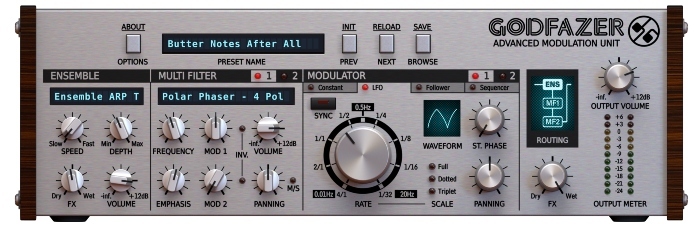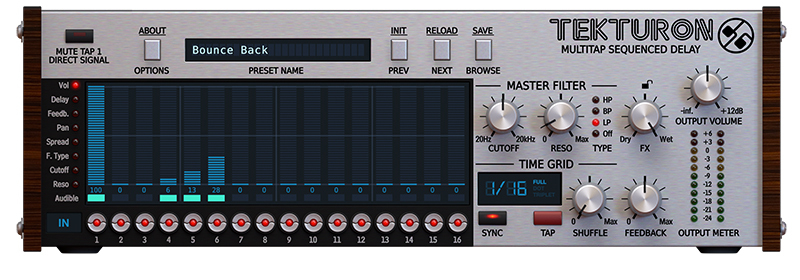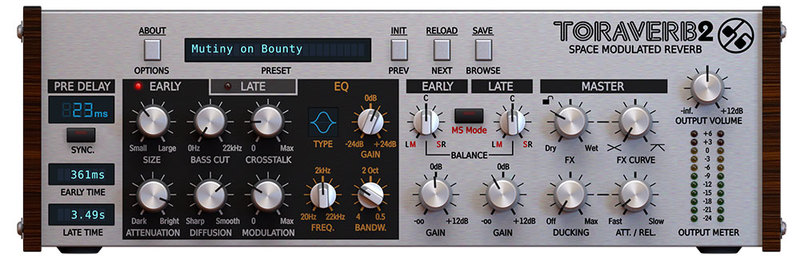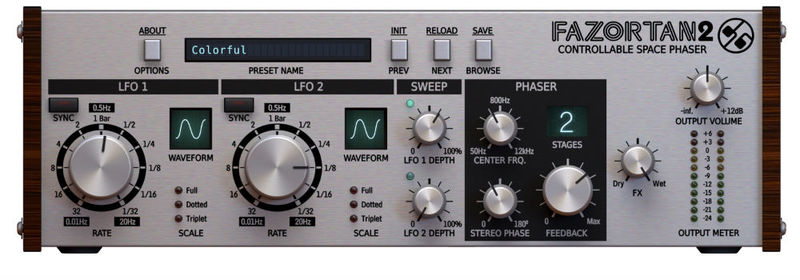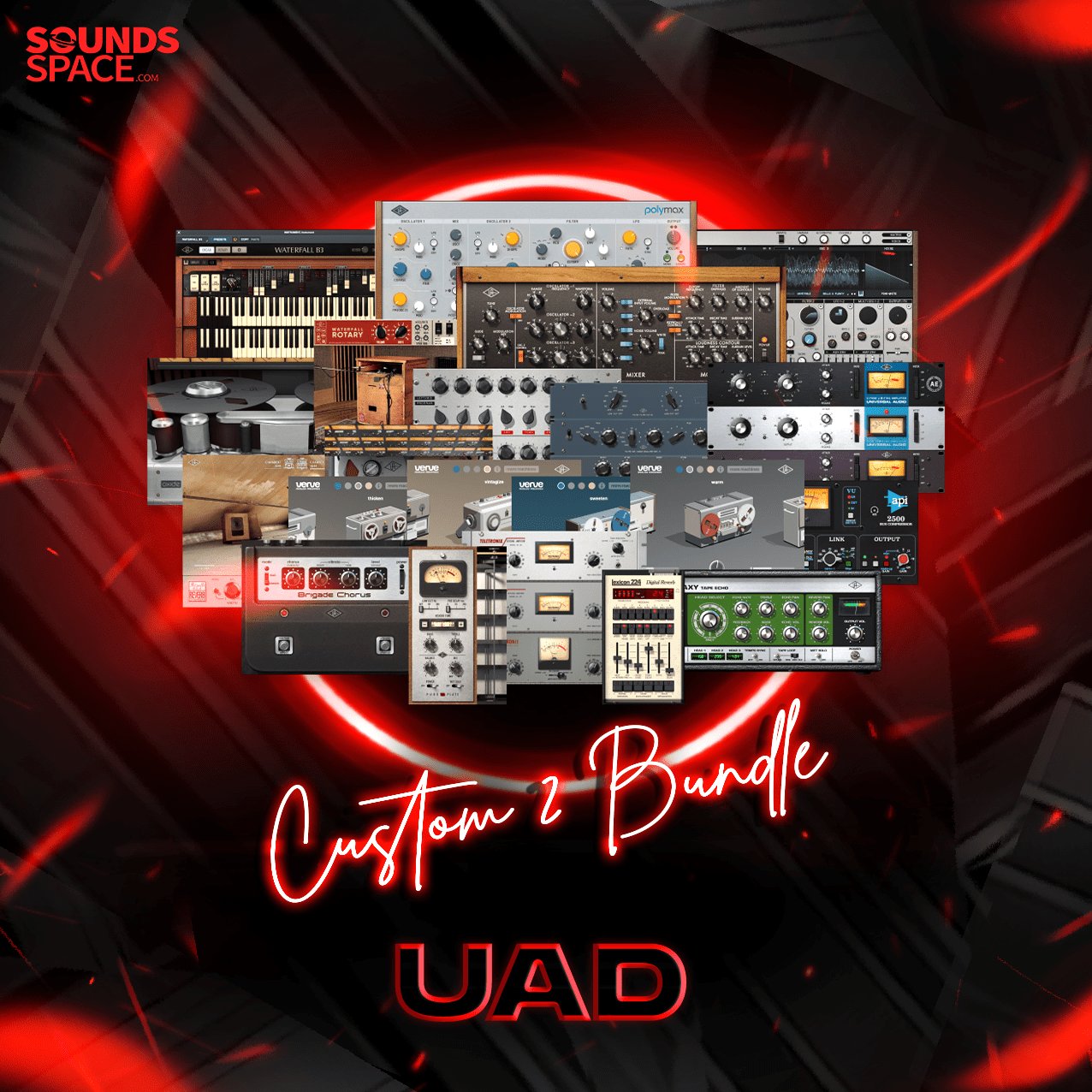Product Description
10 Appreciated Plug-ins Available in this SilverLine Collection
This compact, intuitive reverb plugin creates amazingly authentic real-world spaces without bogging you down in complex parameters.
The hybrid algorithm at the heart of Spacerek fuses modelled virtual spaces to a dynamic delay network, generating reverb tails with supremely realistic early reflections, dense, colourful late reflections, and separately adjustable ER and LR pre-delay times. Dozens of emulated room types take in halls, towers, chambers, tunnels and much more, and each one integrates a variety of preset stereo microphone and speaker setups.
Spacerek also makes balancing the Direct signal, Early reflections and Late reflections easy with its three-channel mixer; while the highly musical Tilt EQ and Low Cut filter modules provide effortless shaping of the overall tail. And as each Reverb Model is pre-configured for left-right or mid-side stereo operation, tweaking width and spatialisation is a snap.
The Virtual Space Reverb
Early reflections are generated through painstakingly accurate simulation of a diverse range of real-world spaces, and the positioning of speakers and microphones within them.
Hybrid Algorithm for Quality and Performance
A dynamic delay network defines the Late reflections, blending seamlessly with the Virtual Space simulation to create super-realistic rooms, at surprisingly low cost to your CPU.
114 Stunning Reverb Models
Choose from dozens of room types, each with multiple microphone and speaker configurations for extensive mixing flexibility and sonic control.
Convenient Mixer
Effortlessly balance the direct signal, early reflections and late reflections using a simple three-channel mixer.
Tilt EQ and Low Cut filter
Sit your reverb perfectly in the mix with the musical Tilt EQ and mid-side-compatible Low Cut filter.
Learn more about Spacerek.
The Swiss army knife of modulation effects
The most powerful modulation effect D16 group has ever created, Godfazer is your new go-to plugin for chorus, phasing, filtering, rotary speaker emulation and much more. Built with creative sound design at the top of the agenda, Godfazer spatially and spectrally transforms signals of all kinds with its versatile Ensemble module and two dual-modulated Multi Filters.
Vintage devices and more
Godfazer’s Ensemble section offers a wide range of delay- and amplitude-modulating vintage device emulations, including BBD-based choruses, Solina-style ensembles and rotary speakers, as well as a variety of original tremolos, auto-panners and other models. But that’s only the beginning! Alongside the Ensemble, two identical Multi Filters each feature 40 spectacularly diverse filter types, from dual shelving EQs, low/high/band-pass models and formant filters, to an extensive selection of vintage and modern phasers.
Powerful modulation
Bringing movement and dynamism to the Multi Filters, Godfazer’s dual Modulators each enable one of four styles of cutoff/center frequency modulation to be brought into play. Apply static offset to the left and right channels with the Constant Modulator; get things wobbling with the tempo-syncable, pannable, phase-adjustable LFO; generate a modulation signal based on input amplitude with the envelope Follower, and hand craft your own synced or free-running cyclical progressions with the 16-step Step sequencer.
Freedom of routing
Both Modulators are routed independently to each Multi Filter, for truly complex signal blending, and the polarity of every input can be inverted at a click. The Multi Filters themselves are configurable for parallel or serial signal flow using six topology options, which also determine the position of the Ensemble within the chain.
... Of course, Godfazer also includes all the standard features of the SilverLine plugin series, including 64-bit internal processing, three quality options for real-time playback and offline rendering, a resizable GUI, and a tagged preset browser. From enhancing beats, thickening basslines and glamorizing vocals, to animating pads and bringing life to keys and FX, no modulation-based task is beyond its sonic remit.
Learn more about Godfazer.
Enter the Delay Matrix
Tekturon is a multitap-delay effect with 16 independent, high-quality delay lines. What really sets it apart from other, similar products, however, is the way it’s controlled and the unique topology into which the taps are arranged: The Delay Matrix. In fact, Tekuron can't be thought of as a tap-delay effect in the strictest sense, but more of a sequence of taps equally delayed from each other, whereby working with the plugin strongly resembles using a step sequencer. This rather unusual design should give your creativity just the kick it needs!
Inspired by Ergonomics
Each and every aspect of the plugin’s workflow is presented in a visually clear and intuitive way, allowing for quick and precise control of every facet of the device, as well as the ability to easily tame all 16 delay lines it contains with global controls. The ability to visually grasp the entire layout with minimal effort allows you to achieve even the most complex results with extraordinary speed.
Learn more about Tekturon.
A Legendary Flanger Resurrected
In bringing the classic stomp box back to life, we’ve created a must-have effect plugin that will appeal not only to performing guitarists, but to instrumentalists and producers of virtually any genre: whether it’s rock guitar riffs or melodic synth lines you’re into, you’ll find that the extreme attention to sonic detail coupled with the flexibility afforded by modern technology in Antresol make it the perfect example of what a flanger should be in the modern era. The original, conceived in the mid-70s, quickly became a benchmark for flanger-type effects by offering a uniquely rich character defined by luxuriously harmonious interacting resonances, and has been heard ever since on countless classic recordings. That’s why D16 couldn’t resist the opportunity to resurrect the soul of this classic in a thoroughly modern incarnation with Antresol, our newest effect in the SilverLine Collection!
Loaded with features way beyond the original
Antresol's users can also enjoy absolute freedom of control over every aspect of the BBD-based delay line (including such nuances as calibration of the linearity of the clocking system or the number of analog memory cells constituting the backbone of the BBD). Fashioning a flanger sound that is uniquely you yet retains all the richness and warmth afforded by the original, classic circuit design has never been easier!
In addition to the standard parameter knobs found on the face of the original unit, there is also a wide range of deeper parameters available to tweak, such the on-PCB trimpots which would normally be inaccessible without taking the stompbox apart. Some even go far beyond those you could find in common flanger-type effects: a fully controllable LFO (with adjustable phase and rate sync to a host application’s tempo); the ability to delink the stereo channels and control the most important parameters independently for left and right (or mid/side, depending on selected mode), and more. Try the demo today and see where your imagination takes you!
True BBD emulation with Total control
An exceptionally accurate emulation of an impulse-controlled, solid-state analog delay line (a Bucket Brigade Device) is responsible for the impeccable sonic characteristics found in Antresol. Effects based on high-quality BBD emulations stand out with remarkable, even seductive warmth, and we have no doubt that the tremendous success of D16’s first foray into BBD delay line emulation, the chorus plugin Syntorus 2, has been directly attributable to this approach.
The key element around which Antresol is designed, an analog BBD integrated circuit, proved to offer some unique challenges for a digital emulation of this type. In particular, the feedback parameter showed some weaknesses in the form of improper shapes of emerging peaks and notches in the frequency response, forcing us back to the drawing board. After much R&D, our Eureka moment came in the form of a much-refined BBD emulation using quasi-analog signal representation throughout, guaranteeing behavior much more akin to the original, physical circuit. While a bit chaotic, it includes all the benefits and subtleties the analog domain can offer—unlike a deterministic, classically digital algorithm—and all this without any unwanted artifacts such as aliasing (something we always take great pains to minimize)… and all with the rock-solid stability only digital can offer!
Learn more about Antresol.
With so many chorus effect plugins on the market, finding one capable of delivering a truly authentic analogue sound is easier said than done.
With that in mind, D16 Group set out to create the ultimate analogue chorus emulation, inspired by the revered effects found in classic synthesizers such as the Solina String Ensemble, Elka Synthex and Roland Juno-106. This fruit of their labour is Syntorus 2, the newest addition to the Silver Line series of plugins.
Syntorus 2’s unique analogue sound enriches any instrument routed into it, bringing life and movement to synth basses and leads, and adding depth and lushness to guitars and other electric/acoustic instruments.
Learn more about Syntorus 2.
The concept algorithm implemented in the unit allows to create practically ANY type of reverb.
When creating Toraverb, we did not base it on any current reverb unit available in the market. We did not implement any "off-the-shelf" algorithm. Toraverb is not a classic type reverb unit like spring, room, hall or plate. Toraverb is a concept algorithm reverb. Using a set of easily accessible parameters, it allows the user to create practically ANY type of reverb. Our goal was to create a reverb which would sound pleasant to the listener and the output could be tweaked in many ways by the user.
Reverb is a critical effect in a mix. Result depends on the reverb algorithm used and the quality of the implementation. Usually reverb is used as a send effect in which many channels in a mix are routed to it. If a low-quality plug-in or hardware unit is used, the end results can sound very disappointing with the reverb tail sounding like it had been “ripped-off” in the mix.
Learn more about Toraverb 2.
Decimort recreates the colouration and adds the vintage sampler's magic to any sound.
Electronic music (especially Hip-Hop) producers have long been aware that classic samplers (such as early Akai and E-MU units) had a character and sound all their own: they added a "grit" and "color" to the samples and loops they played back which made them sound "fat" and sit well in a mix. This sound coloration was due to the encoding techniques, lower sample rate and bit depth, and conversion circuits used by these early samplers. Decimort recreates this coloration and adds that vintage sampler magic back to any loop, any bassline, or any sound played through it for that matter! Beyond vintage sampler emulation, it’s also the perfect bit-crusher with filter, capable of extreme settings for dramatic results.
The highest quality low-quality effect you can buy
While this tagline may seem like an oxymoron on the surface, allow us to explain: the Decimort effect unit (available as part of the SilverLine collection of plugins from D16) is a premium grade bit crusher and sample rate reducer with some highly unconventional features. The advanced signal processing algorithms within Decimort simulate the complex behavior of the entire sampling path that exists in every AD/DA converter, and with version 2 comes far greater control over the process!
Decimort has zero internal aliasing—in fact, the only aliasing present is the emulated aliasing of the classic samplers we modeled when creating it. Unwelcome artefacts are completely absent in the processed signal: only the desirable, modeled ones remain.
More control than any other effect of this type
Decimort isn’t just another bitcrusher with only bit resolution and sampling frequency to tweak; in fact, it provides far more advanced features than you likely could have ever expected from an effect of this kind, all implemented in stunning quality:
- Two optional anti-alias filters - A very steep low-pass pre filter (Approximative Filter) coupled with the resampling frequency that removes all harmonic content above it, ensuring no aliasing will appear below this frequency in the spectrum. A further post filter (Image filter), also synchronized with the resampler, gives control over amount of aliasing images appearing above resampling frequency when enabled.
- Adjustable Jitter - An unprecedented feature in the bit crusher’s world which introduces short-period, random fluctuations to the resampling frequency, thus making the process even more sonically interesting by producing a type of harmonic distortion you’ve likely never heard in this context.
- Two quantization methods - Two available quantization methods; the mid-raiser and mid-tread decimation algorithms, each of them characterized by a drastically different dynamics response.
- Controllable dithering - Dithering was conceptually developed as means to reduce audible quantization errors by masking the harmonic distortions they cause. We added controllable dithering to increase number of ways in which you can (mal)treat the sound.
All this adds up to a very powerful and musical tool which is not only another creativity-releasing item for your arsenal, but one that gives you the ability to emulate classic sampling units in-the-box—now with even greater precision through access to a variety of parameters unavailable up till now in effects of this type!
Learn more about Decimort 2.
Vintage Tube Distortion effect
Precisely modeled tube distortion module capturing the sensitivity, warmth, and character of real tube saturation and analog circuits. NEW With refined emulation.
Parametric EQ
4 Band fully parametric equalizer provides unparalleled control over your overdriven and distorted tones.
Independent stereo processing
Redoptor accurately emulates the sonic signature of a classic high-gain guitar amplifier while offering the flexibility of a modern stereo signal path.
Dynamics under control
A compressor before the gain stage lets you shape the tube circuit’s response, and a master output limiter tames your fierce distorted levels.
Overview
Redoptor is a high quality Vintage Tube Distortion emulator
The organic sound of a tube amplifier being pushed into breakup has been the gold standard for overdriven and distorted tones for as long as musicians have been intentionally distorting their signals.
The gentle natural compression and rich blend of even and odd harmonics produced by analog tube circuitry make any effected signal feel more powerful, punchy, and alive.
Unlike solid-state transistor and fuzz circuits which only produce odd harmonics and limit the incoming signal in an unnatural and unresponsive way, Redoptor smoothly and dynamically responds to the changes in volume of incoming audio, just like a real tube amplifier. This means that louder sounds are saturated with more crunch and delicious harmonics, while softer and naturally decaying sounds clean up gradually. This creates a very sonically pleasing distortion.
Learn more about Redopter 2.
Fazortan 2 is the new incarnation of Controllable Space Phaser which is part of our SilverLine Collection. No need to say we didnt cut much corners on quality and that robust, yearned by all - analog feel of the sound. Total control over the Phase shifter provides you with adjustability and allows to obtain the desired contour with high precision. Have you ever wondered where does that unique magical breeze so audible in most of Jean Michael Jarre's tunes come from. Surprisingly the backbone here isn't the synth itself but the effect unit coupled with the synthesizer, saying more precisely - analog phaser of which our Fazortan 2 seems to be a fine equivalent. Thanks to the analog modelling technique we were able to implement allpass filters comprising characteristics identical to its analog counterpart based on Operational Transconductance Amplifiers. Now in version 2 we're even closer to the sound character the original hardware unit brings.
You can think about Fazortan 2 as of the exact copy of a retro phaser taken out from 70's and redone to become a virtual unit. But being the same sounding unit that provides primal functionality and sound of the original is where similarities end and where limitless scope of plugin comes to play. Bearing on mind only one Rate knob and a Color switch on the front panel of the real phaser device, Fazortan 2 from the first look at its GUI, presents itself as a completely new device that effectivelly expands capabilities of its origin.
Structure
Full control over two LFOs (waveform, rate and depth) controlling the unit and unlike the hardware unit Fazortan 2 LFO works in various waveform modes: sinus, triangle, hyper-triangle and random (i.e. only triangle is available in original).
By using both LFOs simultaneously you're now able to obtain the result that owners of the hardware box could only dream about. Endless countour diversity stretches results from monotonius sluggish swing to become a gurgling scrumble, just by a slight repositioning of the rate knob. Additionally, it is now possible to add consecutive allpass stages as well as regulate the feedback effect. The amount of stages translates on how many humps and pits residues in the converted sound spectrum while feedback parameter value implies severity of these irregularities. Feedback knob gives you sounds from soft to rapid and drilling. To visually display how it works consider a white noise as an input signal. Moving the feedback knob will start to morph incoming "sea waves" reminiscent noise into "windy" whizz. Additionally, each lfo can be modified by altering its respective phase giving, as a result, an improved panning of the incoming signal.
Learn more about Fazortan 2.
The sweet spot in distortion domain
Devastor 2 is the second generation of D16’s first FX Plugin from the SilverLine Collection series. Devastor is a deceptively simple yet remarkable Multiband Distortion Unit. It is an enhanced version of the distortion unit you can find in Phoscyon, but with full control over multiband processing. This elevates its sonic mangling capabilities to an entirely new level!
Structure
The plug-in consists of four essential blocks:
- Dynamics-flattener module (one-knob controlled input signal compressor)
- Diode-clipper distortion
- Three multi-mode filter sections
- Optionally activated signal limiter
The plug-in offers nine different connection topologies between its filters and diode-clipper. Filters can process the signal before or after it gets fed into the diode-clipper, but some of the configurations even allow the filters to work alongside the clipper, which greatly increases the possible sonic palette.
Devastor’s filters are not simply the peaking EQ type that is commonly used in classic multiband distortion units: rather, they are like those found in analog synthesizers (low pass, high pass, bandpass, and band-reject) with adjustable resonance and cutoff parameters. As a result, Devastor has a completely unique sound. Just check out the factory content and hear for yourself!
Versatile and advanced
Devastor can be used to distort and enhance a wide range of sounds, from full-on acid synth sounds to guitar fuzz or an analog amp with a speaker combo. It can even be used with drums to make them sound dirtier and more dynamic! Devastor isn't just good at creating distorted, monster sounds: it can also be used subtly to improve the timbre and character of gentler sounds. For example, reducing the preamp gain, increasing the threshold, and selecting a soft knee for the dynamics will bring out more warmth and detail in a sound without introducing distortion.
When designing Devastor, we applied special antialiasing techniques to the output signal to make sure it was devoid of aliasing (one of the reasons why digital distortion units can sound so cold and un-musical). As a result, Devastor has a warm, musical, and very high-quality sound.
We would like to invite you to listen the audio examples to whet your appetite and to check out the demo version for yourself if you need any more convincing. Devastor uses algorithms of such high quality that you'd be forgiven in a blind test for wondering if the sound has somehow been sent from the computer to an external analog distortion unit and back into the computer again!
View Installation Instructions
System Requirements
Windows PC
- Windows 7, 8 or 10
- CPU: 2.0 GHz SSE (Multicore 2.3 GHz recommended)
- RAM: 8 GB (16 GB Recommended)
- Software: VST / AAX compatible host application (32 or 64-bit)
Mac OS X
- macOS 10.7 and later (macOS 11 Big Sur compatible)
- CPU: Intel-based 2.0 GHz (2.3 GHz recommended)
- RAM: 8 GB (16 GB Recommended)
- Software: AU / VST / AAX compatible host application (64-bit only)
Please Note: This is not a standalone program - a host application (DAW) is required to use it.




